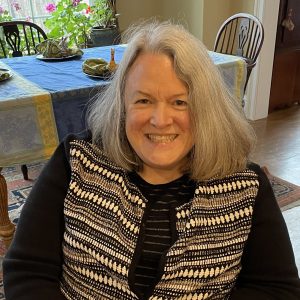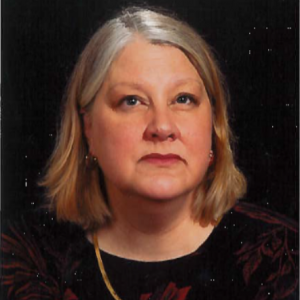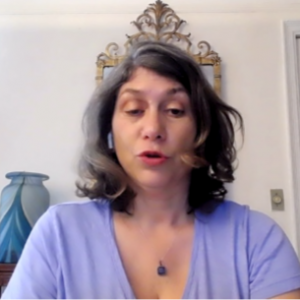Mary Keating, Recalibrating Gravity
Welcome to the world of Mary Keating, a quick-witted, fun-loving paraplegic. (Note, however, that she cringes at being labeled.) When life becomes overwhelming, Mary jokingly pretends she’s trapped in a bad B movie waiting for a new director. Her poetry collection reminds us that no matter how hard life may seem, grace, love, and humor will save us from despair and allow us to live our best life under any circumstances.
Fifty years ago, Mary’s wide-open world instantly contracted at age fifteen when a drunken teenager drove her into an oak tree at maximum speed. With a wheelchair as a permanent accessory, she was no longer seen as “hot” or one of “in” crowd. She found herself transported into an alternate reality—defined now by her disability.
As her best friends, along with her boyfriend, drifted away, she found poetry the perfect companion to explore the complexities of life, stereotypes, and human existence.
A graduate of Yale Law School, she’s had her own law practice in Darien, Connecticut for over thirty years. She’s a strong advocate for disability rights and served as President of the State Rehabilitation Council.
Mary’s poems appear in several journals and anthologies. including Wordgathering, Santa Fe Writer’s Project, and Poetry for the Ukraine. Two of her poems, “Ouroboros Frayed” and “Insidious,” were nominated for a Pushcart Prize.
With her adventurous spirit, Mary continues to travel a not-so-accessible world, finding the help of friends, family, and strangers when needed. One of her clients helped her become a certified advanced scuba diver. Mary lives with her husband, Dan, in Connecticut and thanks God every day for his steadfast love.
Sara Jenlink, Stone Cold Murder
In Sara Jenlink’s Stone Cold Murder, an adult murder mystery, Tanzy Stone has struck out to follow the footsteps of her great-aunt for whom she is named. Raised on a Kansas farm, she wants to travel the country before settling down. But risk is lonely, and hard, as she discovers when she lands in Prescott, Arizona and opens the door to murder.
As a substitute teacher, Tanzy drops into a toxic situation created by the deceased woman. Suspects are plentiful. She is now in danger from a drug ring, and her own rising feelings for the detective working the case.
As they work the drug ring angle, the unseen dark actions of the killer are developing. Logical reasoning is Tanzy’s strength; passion is the killer’s. Protecting his own moral code, the killer vows to make a difference for the love of his life, even if she says no. Tanzy must stop him.
Pamela Martin, Dancing With Loons
Life doesn’t run smoothly, but in the end, it’s who is willing to take that journey with you: who is willing to guard your secrets, even when they have consequences. But even the best of friends can’t always rescue you from the choices you make.
Dancing with Loons is a novel of love and sisterhood between friends. In the summer of 1974, Lizzie, Maeve, Thea, and Charlotte have just graduated from high school. Before heading to college, they gather at Thea’s lake cottage in Northern Minnesota. They form a contract to be there for one another, no matter the time or distance. No matter the reason.
Ten years later, the first call comes. Though their lives have diverged, the pack will always come together to rescue one of their own. Through the decades, a friendship forged in a childhood schoolyard strengthens as they navigate life’s challenges. But what if love and happiness are an illusion, not reality?
After decades of ghostwriting for others, Pamela Martin has emerged from the shadows to share her first novel. While writing anything and everything is her primary focus, she is also a proud mother of four daughters, a creative director, a trivia nut, an avid reader, and a travel junkie who has called three countries home.
Returning to the United States from decades in Toronto, Canada and now living in Virginia, Pamela can often be found with a book in one hand and a proper cup of tea in the other, alongside her beloved Irish husband/business partner, John, and their drowsy and handsome English Bulldog, Rooney.
Mara Schiffren, The Mistake
One young man, two identities.
In historical novel The Mistake, from Marcus’s birth in wealthy Sardis in Asia Minor, his unwed parents compete for his love. He inherits a genius for fighting and strategy from his father, Julius, a Roman centurion; from his mother Miriame, daughter of a merchant family, a fascination with Jewish ethics and lore.
At a time of deepening tension between the Jews and their Roman overlords, Julius’s cohort is relocated to Caesarea in Palestine. Onto this scene steps Miriame’s charismatic brother, Jonathan, a trader and spy. With Julius away, Jonathan takes Marcus on a trip to teach him about trade. Marcus encounters a society steeped in family warmth and mysticism that is more enticing than the hard military world in which he was raised.
As Julius feels his authority over Marcus slipping, he becomes more controlling, triggering a vicious cycle in their relationship and a fallout that will reverberate in history.
Mara Schiffren was born in New York City and moved around the two coasts of the USA as a child. She grew up in love with mythology, history, and philosophy. After college she moved to Israel for a few years to pursue her interest in studying Jewish history and religion, culminating in a Doctorate in The Study of Religion with a focus on the development of Jewish mysticism in the Hellenistic and Roman periods. This was a time when three powerful cultures met and clashed and out of the cataclysm, modern Western culture began its formation. She currently lives in North Salem, NY, with her pets, where she writes locally and coaches wellness, peak performance, and creativity.
Erik Tolley, Beneath a Sky of Stone
In science-fiction book Beneath a Sky of Stone, Ryan Shaw awakens in a strange hospital, badly injured but miraculously alive, and learns that he has fallen 17 kilometers (10 miles) into a crevasse in the Earth’s crust. He is trapped in the Republic of Inner Earth, an underground civilization formed by scientists who fled the surface in 1898 and sealed themselves into massive underground caverns prior to the First World War. The society was idyllic for decades before fracturing into conflict, espionage, and war, with the free people—Echoans—living in Echo City and the totalitarian Guild of Electricians—Tricians—in the City of Ünterreich.
With no way back to the surface, Shaw must battle his own inner demons and grief to survive in this world of strange machines and stranger weapons, where few things are as they seem and nobody knows who to trust.
Living in Beaumont, Alberta, Canada, Erik Tolley managed to meet and marry a beautiful woman named Kallie, with (fortunately for him) low standards and poor judgement in potential husbands, who has been the love of his life for 18 years. With Kallie he has built a family including four children, Odin (16), Thorin (14), Linnea (11), and Aksel (9), and two chihuahuas.
Erik spent eight years as a Combat Engineer for the Canadian Army, in which he served overseas as a landmine and unexploded ordnance specialist. For the last 18 years he has been a Constable in the Edmonton Police Service, where he currently works in the Forensics Unit as a Ballistics Analyst. Erik’s dream is to retire from police work and write full time.




